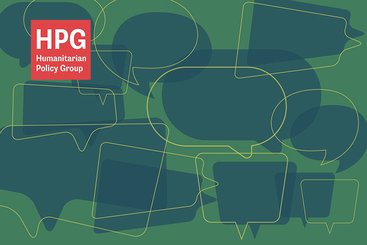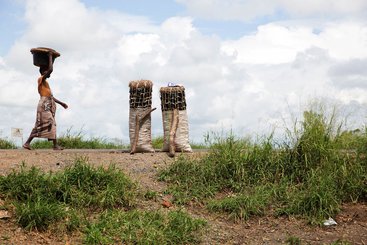Five years after the World Humanitarian Summit, humanitarians have failed to deliver on the most basic of humanitarian endeavours: to put people ‘at the centre’ of what they do.
Despite repeated surveys and studies detailing that the aid given to people in crisis is not what they want or need, Grand Bargain commitments in 2016 to spark a ‘participation revolution’ have not even ignited.
This year’s assessment from the Humanitarian Policy Group’s independent review of the Grand Bargain will conclude that, after five years, there is no evidence of humanitarian action becoming more demand-driven. It blames a consistent lack of political interest in participation, combined with a lack of incentives to drive it forward. This lack of prioritisation is highlighted most tellingly by the fact that the outgoing Emergency Relief Coordinator (ERC)’s new proposal to strengthen participation and accountability – an Independent Commission for Voices in Crisis (ICVIC) – is amongst his final, not first, priorities.
A failure to take account of power in the humanitarian system
In tinkering at the margins of the traditional humanitarian system, the ERC’s proposal on participation looks similar to previous initiatives that have tried and failed to achieve greater accountability. Change will not happen without recognising and addressing the structural power dynamics of the humanitarian system, which privileges the interests of aid actors over crisis affected populations.
With annual budgets comparable to states, mandates to oversee state compliance with international laws, and responsibilities to deliver basic services to entire populations, the humanitarian system can function like undemocratic states. In the absence of a clear social contract between aid actors and the people they serve, their political authority is not matched by political accountability. Nowhere is this unchecked power more evident than in the ongoing sexual abuse scandals that continue to engulf the sector.
Rather than focussing on downward accountability to people, current incentive structures demand upwards accountability to donors. This, along with the ‘expert’ authority of aid actors and the depoliticising of aid environments, leads to a narrow conceptualisation of humanitarian assistance as a series of technical projects and, too often, the depiction of people as data points in a logframe.
These projects are all too often disconnected from the dynamic politics of the places in which they are implemented, and strip people of their political identities and agency. All of which means that humanitarians remain firmly in control of setting the terms of what is ‘up for discussion’ – terms which rarely align with the lived experiences of affected people themselves.
What is participation for? And who does it serve?
Right now, humanitarians remain heavily focused on participation as a means to improve their projects, not to truly share or hand over power. They solicit ‘feedback’, ‘ideas’, and ‘suggestions’ to ‘inform’ decisions that they still ultimately make, often not only independently of people in crisis and their priorities, but also independently of each other. This loses sight of the older, developmental idea of participation as an emancipatory, empowering and political process. That it is a right, enabling people to make sense of the world, build solidarity and hold those in power to account.
If humanitarian actors genuinely care about supporting crisis-affected people to act as agents of their own futures, they need to go beyond asking “how can we put people at the heart of our programming” and think instead about how people can be supported to raise their voices, organise, understand and claim their rights. Voice must mean influence.
Where do we go on participation and accountability?
There isn’t a single answer and it can’t be projectised into a single initiative. But solutions may come if we pay more attention to the perspectives of crisis-affected populations, and if we see humanitarian action as part of wider efforts to strengthen political participation.
1. Go beyond projects: understand and act on people’s perspectives
International humanitarian assistance is only ‘the tip of the iceberg’ of the support that people in crisis receive, as little as 1% of resources in some contexts. The rest is made up of monetary and in-kind support from communities, remittances, local and national government resources and other forms of financing. This means that aid actors need to understand holistically the priorities of affected communities, and see their assistance as part of a wider system of support.
Increasingly, top-down needs assessments are being complemented with innovative approaches to understanding perspectives, including perception surveys, anthropological approaches to analysis, and cross-cutting, ‘collective’ approaches to understanding and analysing needs. But even with more and better data on people’s priorities, ensuring this drives change and influences decision-making is a major stumbling block, pointing to a need for stronger buy-in at senior leadership level.
It is not just about better understanding. Changes in programme design would help too. Flexible funding would allow programmes to better adapt to feedback; while increasing project timelines would allow for more iteration, learning, and the basic trust-building required for communities and service providers to work effectively together. In protracted crises, participatory planning processes, instead of rushed needs assessments, should be standard. Building on this, a proposed shift to area-based coordination could allow a re-focusing of programmes around the interwoven needs of a specific population, rather than the rigid silos of the cluster system.
2. Strengthen consequences for inaction by international actors
Aid actors have proven highly impervious to acting on the knowledge they have of what people in crisis need. Strengthening this knowledge is an important step, but aid agencies have proven time and again their intransigence in the face of compelling evidence of more effective, efficient or locally-relevant ways of operating. The continued lack of agreement of a lead agency on cash coordination is the most recent example of aid agencies’ unwillingness to act for the common good when this could involve a loss of funding.
It is clear that aid agencies need to be compelled, rather than encouraged, to put people’s needs first and to listen more to their priorities through higher financial and reputational consequences. The limited effects of donor pressure suggest that the required change will not come from within the system alone.
While the ICVIC proposal makes efforts to strengthen accountability through an independent review body, this is still embedded too firmly within current aid systems to be sufficient. Stronger, independent scrutiny from media and other actors beyond the system is required. Affected people themselves should be supported to understand their entitlements and the commitments humanitarians have made on their behalf, and to demand answers – publicly and embarrassingly if necessary – when these are not met.
3. Provide more opportunities for affected people to exercise power directly
The Grand Bargain’s participation workstream envisions an ‘ongoing dialogue’ (PDF) between communities and aid providers, but this isn’t happening. Opinions and feedback usually flow on a one-way path upwards, filtering through layers of intermediaries before reaching people making decisions. This precludes opportunities for frank negotiation around the trade-offs between community aspirations and the limited ability of humanitarians to meet them. An enumerator or community mobiliser will rarely be able to explain why decisions further up are made. You can’t have an argument with a feedback box. Affected people must be deliberately brought into decision-making processes, including through the following:
- Regularly and proactively hire affected communities as aid agency staff, in management positions as well as ‘volunteers’. This is an informal, but critical, means of making sure local knowledge is baked into programmes. It also reduces the ‘othering’ of affected communities on the part of programme staff, and limits assumptions being made about their lives.
- Bring community leaders and local civil society groups to the table through area-based coordination so that they are engaged in decisions directly relevant to their lives.
- Understand how more locally-led humanitarian action and increased participation are deeply intertwined processes (PDF). Like participation, advancing local leadership in aid is increasingly seen as a process of self-determination. Local organisations are more attuned to context and better trusted by the communities they serve. Complementing more local leadership, ‘survivor-led’ approaches that place planning and budget decisions in the hands of communities offer a window into what a truly participatory humanitarian future might look like.
4. Work with development actors to embed strategies in wider political participation processes
Finally, it is important to acknowledge that humanitarian programming never takes place in a vacuum but is embedded in a wider political landscape. Development actors have been undertaking important work on participation for years. Humanitarian work on participation needs to be seen as part of wider political processes that challenge oppression and marginalisation, where supporting community leadership, solidarity and a flourishing civil society is an important end in itself; not just a means to improve programme delivery. This points to both the need for alternative models of humanitarianism, and for conversations around the ‘nexus’ to re-focus away from top-down planning and financing, and towards collective efforts to strengthen the voice and rights of those in crisis.
Participation is an important, long-term process of change, yet it is somewhat of an add-on in current proposals for the next Grand Bargain. Its scope and ambition need to be clarified, and matched with political buy-in. Humanitarians need to go beyond talking about a revolution.




